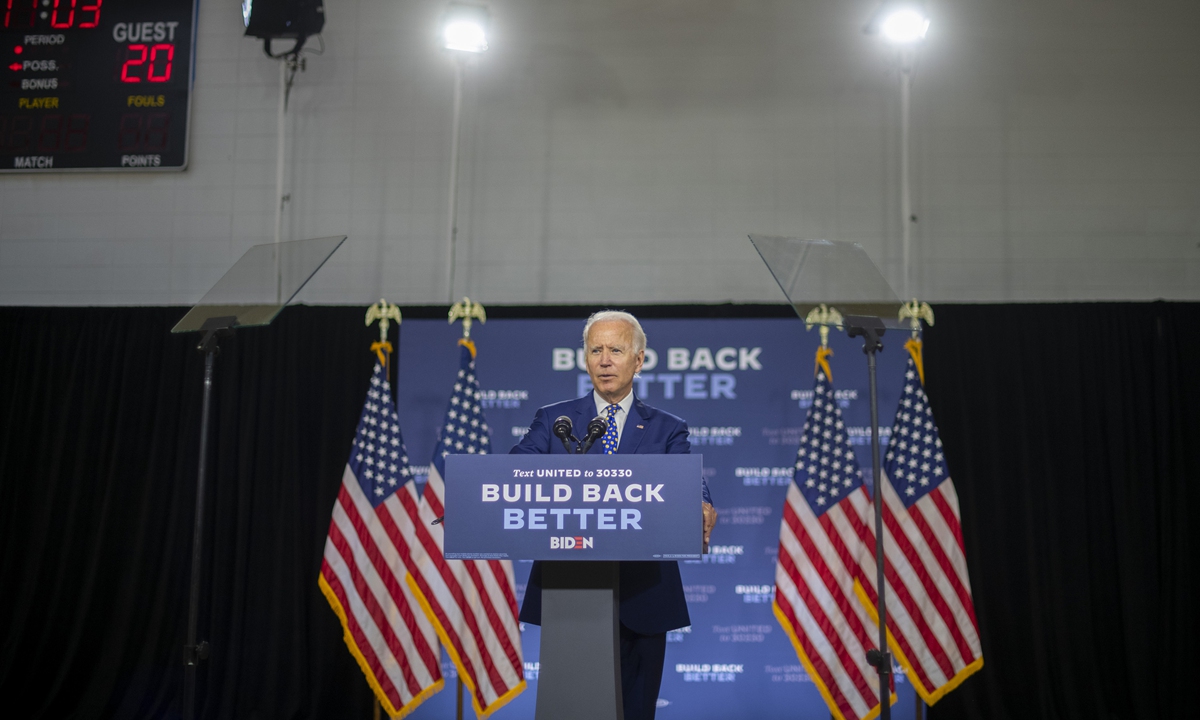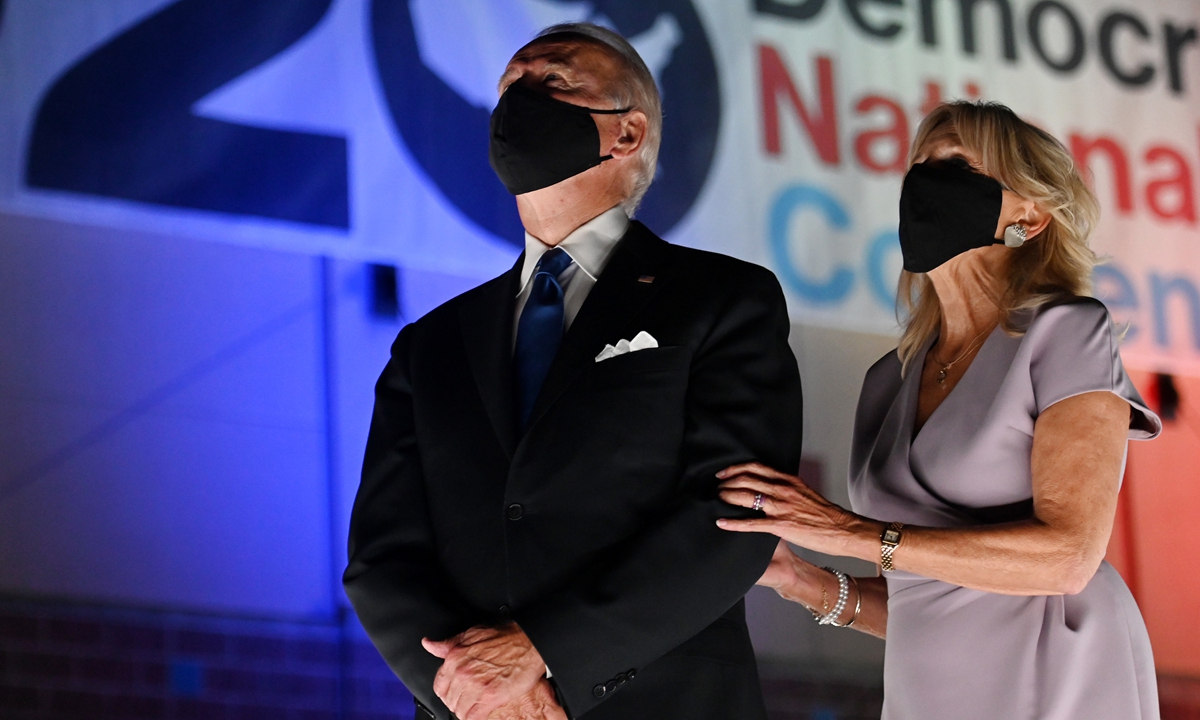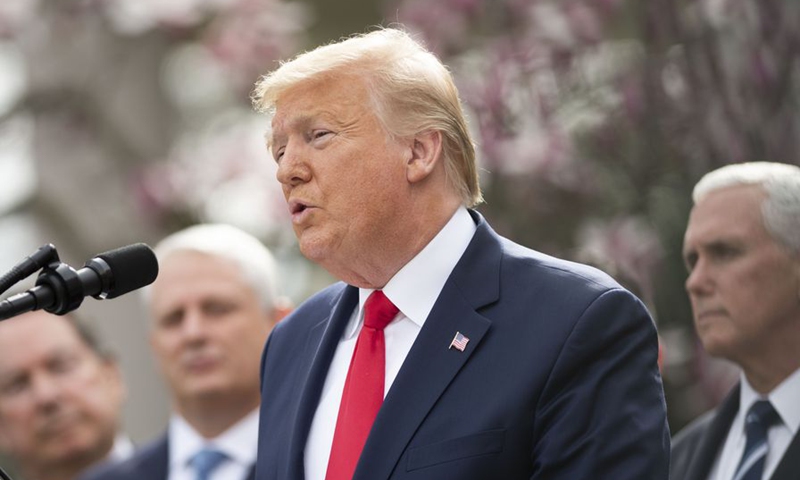Biden mentions China once in closely watched acceptance speech
By Liu Xin and Fan Lingzhi Source: Global Times Published: 2020/8/21 20:13:40 Last Updated: 2020/8/21 21:22:54

Joe Biden Photo:VCG
Biden formally accepted the nomination on Thursday at the Chase Center in Delaware on the last day of the Democratic National Convention. Some US media described his speech as an opportunity to look at the Democratic nominee for the longest time and clearest view, as he has kept a low profile and attended relatively fewer public events.
Biden started his speech by accusing Trump of cloaking America in darkness for too long with "too much anger," "too much fear," and "too much division." He said America faces the most difficult moment amid the worst pandemic in over 100 years, "the worst economic crisis since the Great Depression," and "the most compelling call for racial justice since the 60s."
He continued to call for unity and promised to reverse the failure of the Trump administration in dealing with the coronavirus pandemic by deploying rapid tests and having a national mandate to wear a mask.
Biden's speech reflected himself - steady and well-organized, but lacking in sparkle. He seems to stand in the center of the universe in calling for love and unity - trying to portray himself as Trump's opposite by using "light," "hope," and "love" as against Trump's efforts to spread "hatred," "darkness," and "division" in the US, Sun Chenghao, an assistant research professor at the Institute of American Studies of the China Institutes of Contemporary International Relations, told the Global Times.
According to a CNN Poll of Polls released on Monday, Biden led Trump by a 9-point margin nationally which has significantly narrowed since June. Experts said that considering Trump's ability to manipulate media and inciting supporters, it's possible he may turn the table.

Former vice president and Democratic presidential nominee Joe Biden and his wife Jill wear facemasks as they watch a fireworks display outside the Chase Center in Wilmington, Delaware, at the conclusion of the Democratic National Convention, held virtually amid the novel coronavirus pandemic, on Thursday. Photo: AFP
Biden made his promises on issues that Americans care most about, and cleverly mentioned China only once - refusing to take Trump's bait in playing a tougher card against China, Sun said.On how he would deal with the coronavirus if elected president, Biden said "We'll make the medical supplies and protective equipment our country needs. And we'll make them here in America. So we will never again be at the mercy of China and other foreign countries, in order to protect our own people."
"China has never been the reason for US domestic problems, which can also never be solved by shifting blame to China. Americans may not veto a president for his foreign policies, but for his failure to tackle domestic problems," Sun said.
The US has reported 5.57 million coronavirus cases as of Friday, with a death toll of 174,283 - the world's most - according to Johns Hopkins University data.
There were 1.1 million initial jobless claims on a seasonally adjusted basis for the week ending August 15, the US Department of Labor said on Thursday. That was higher than economists' forecast of 925,000.
With all these domestic problems being unsolved, Trump and some US politicians have ramped up efforts to attack and provoke China - from blaming China for the coronavirus, to sanctioning Chinese high-tech companies like Huawei, and from accusing China of messing up US election, to sending aircraft to the Taiwan Straits. Trump has also hyped the "China threat" theory to the US if Biden wins.
Trump's crazy accusations and attacks against China, as well as sowing ideological bias, would do no good to improving the US' current situation or protecting US companies, Zhu Feng, director of Institute of International Studies of Nanjing University, told the Global Times.
"However, Trump's incitement still attracts some groups in the US. And Biden's slight mention of China showed he did not want to give Trump an excuse to attack him," Zhu said.
Biden was criticized after he downplayed the economic threat posed by China during a campaign stop in Iowa in May 2019.
Trump and his supporters also criticized Biden on Thursday. Just before Biden's speech, Trump spoke with Fox News' Sean Hannity, slamming Biden for not taking questions, and accusing Democrats of "trying to steal the election" by insisting on mailed-in voting.
"In 47 years, Joe did none of the things of which he now speaks," Trump tweeted while Biden was speaking. "He will never change, just words!"

US President Donald Trump. Photo: Xinhua
Moves matter more
Although Biden did not touch on China in his acceptance speech, it does not mean he would take a softer approach to China if he wins, since it has become a bipartisan consensus for tougher policies against China, Chinese experts said, noting the tough tone on China in the Democratic Party platform.
The word "China" appeared more than 20 times in the 2020's platform while in the 2016 version, China appeared seven times. The 2020 one claimed to be tough on technologies, intellectual property, security and human rights, and also plans to draw more allies to its side.
One noticeable point is that compared to the platform released in 2016, the 2020 version removed the "one-China" principle, and said that "Democrats are committed to the Taiwan Relations Act and will continue to support a peaceful resolution of cross-Straits issues consistent with the wishes and best interests of the people of Taiwan."
According to the Taiwan Relations Act, the US could sell arms to the island and interfere in China's domestic affairs. Chinese observers have criticized the Act as a violation of China's national interests and support to separatists in the island.
Analysts said the Chinese mainland should be alert on these changes, as some hardliners from both parties in the US will be playing the Taiwan card more to contain the Chinese mainland, which will also send a wrong signal to secessionists in Taiwan.
In response to the Democratic Party removing the "one-China" principle, Chinese Foreign Ministry spokesperson Zhao Lijian told a press briefing on Friday, "We hope that the two parties in the US can view China and China-US relations in an objective way, and work with China to advance bilateral ties based on coordination, cooperation and stability."
Removing "one-China" is ill-intentioned, but does not mean it would deny the principle. Party platforms are updated every four years, and are not directly related to the election campaign, for example, Trump's extreme deeds had little to do with the GOP's platform in 2016, Lü Xiang, a research fellow on US studies at the Chinese Academy of Social Sciences, told the Global Times.
There is no need to focus on what US politicians say, as once the US crosses the red line, China will know what to do, Lü said.
If Biden reverses the one-China policy after taking office, China-US ties will be pushed to a more delicate and dangerous situation, Zhu said, noting that removing the principle may be the Democratic Party's strategy to avoid being attacked by Trump or showing weakness on China.
RELATED ARTICLES:
Posted in: DIPLOMACY